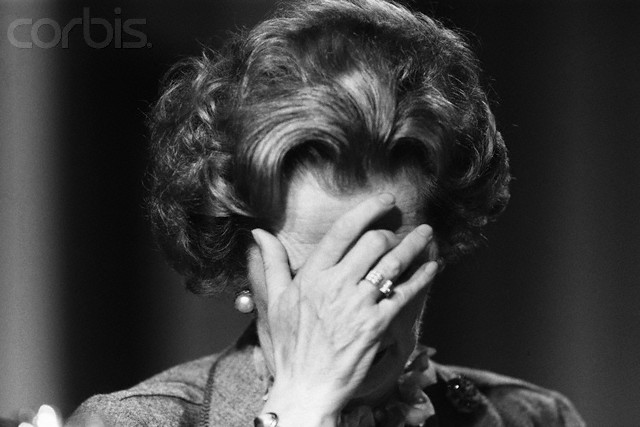‘We have created the new common ground, and that is why our opponents have been forced to shift their ground…We are told the Social Democrats now see the virtues of capitalism, competition and the customer. We have entered a new era. The Conservative Party has staked out the common ground, and the other parties are tiptoeing onto it.’
“The facts? The facts? I have been elected to change the facts!’’
Lady Thatcher was loved, loathed and never ignored. Thatcher can be classed together with David Lloyd George and Clement Attlee as political leaders who sought power with the express intention of changing society, and did so to the best of their ability. Thatcher was reputedly asked what her greatest legacy was and she answered ‘New Labour’. Peter Mandelson, meanwhile, a doyen of New Labour, stated in June 2002, ‘We are all Thatcherites now!’.
Despite Mandelson’s claim, not everyone would agree. Thatcher’s passing marks the death of the most divisive, iconic and symbolic political leader in British politics since Oliver Cromwell. According to Peregrine Worsthorne, Thatcher was the first evangelist prime minister since Attlee entered Number 10 in 1945.
Mrs Thatcher’s place in British political history is undoubtedly confirmed. Dominic Sandbrook stated that, ‘Blair, Brown, Major…In 100 years they will be long forgotten…but the world will still be in awe of the grocer’s daughter from Grantham’. Thatcher comfortably outlasted all previous twentieth-century premiers, and historians had to delve back to the pre-reform career of Lord Liverpool — between 1812 and 1827 (and before that to Pitt the Younger, Henry Pelham or Walpole) — to find a prime minister who survived longer.
Yet Thatcher’s death does not kill off the ideology that bears her name. Thatcherism is vested squarely in the person of Thatcher. David Marquand wrote that, ‘a history of the Thatcher years that ignored her extraordinary combination of will, courage, guile, and rhetorical skills would be Hamlet without the Prince of Denmark’. Many of the shibboleths of Thatcherism were embodied in Thatcher’s lifestyle and personal beliefs: the idealisation of the lower middle petite bourgeoisie classes; a celebration of Victorian values and traditional morality; sound money, monetarism and the free market economy; and a Christian ethic underpinning a civil social order. Thatcher’s biographer, John Campbell, rightly judged that a cult had been built around her:
‘By the middle of the decade Mrs Thatcher had become an institution, a seemingly permanent part of the national landscape, around whom grew a personality cult unlike anything seen in Britain before.’
However, Thatcherism is not a simple aggregation of Thatcher’s policy speeches and individual preferences. Herbert Morrison once argued that ‘socialism is what the Labour Party does’. But Thatcherism is not what Thatcher did. For Nigel Lawson, her Chancellor of the Exchequer from 1983-89, Thatcherism was not ‘whatever Margaret Thatcher herself at any time did or said’. The Oxford historian Ewen Green went so far as to suggest that, ‘Thatcher herself played very little part in generating the ideas that were at the heart of the Thatcherite agenda’.
Thatcherism was made possible by the circumstances of historical contingency and events. It was a byproduct of an imbroglio of events: the collapse of Bretton Woods; the collapse of Keynesian demand management; enduring decline; growing disillusionment of welfarism; the extremism of class politics; the oil price hike; the consecutive Tory defeats in 1974; trade union militancy; the emerging ’embourgeoisement’ of the aspiring working classes; the Winter of Discontent; and a revival of a ‘climate of opinion’ receptive to orthodox economics and conservative social morality. Thatcherism however is still hotly contested, twenty-three years after Thatcher’s resignation. This is in part because the governments of John Major, Tony Blair, Gordon Brown and the present Coalition Government under David Cameron and Nick Clegg, are said to have preserved the broad political settlement her governments cemented. Simon Jenkins called them ‘Sons of Thatcher’. Blair’s attempt to modernise the Labour Party was done with reference to the political changes that occurred in the 1980s. New Labour, in some respects, played the ‘politics of catch-up’: incorporating the political ‘common sense’ Thatcher ensconced in the 1980s, effectively moving Labour to the Right of the political spectrum. Thatcher’s former political enemies had in effect accepted that the macro-level changes her government made to British society were not only irreversible but, in part, desirable.
Thatcher becomes an ‘ism’
Despite the preponderance of Thatcher, Thatcherism it is still little understood. ‘The more I contemplate the phenomenon’, said Marquand, ‘the more protean and elusive I find it’. For the Left, Thatcherism was a toxic composite of stifling nationalism, the engine of repression, poujadisme middle-class parochialism, traditional family values and the themes of a revived neo-liberalism: self-interest, selfishness, competitive individualism, anti-statism and a cult of greed. For the Right, Thatcherism restored Britain to health, economically, socially, civically and politically, after what S. E. Finer called the ‘thirty year bore’ of the post-war social democratic liberal years: restoring market discipline and the ‘enterprise culture’; eradicating the iniquities of state intervention and bureaucracy; a strong autonomous executive state; a revived, marketised, civil order; the democratisation of trade unions; a repudiation of collective guilt and a confidence that Britain had stemmed decline by restoring the ‘vigorous virtues’.
In recent years, both the Left (Stefan Collini, Gerald Cohen) and Right (Charles Moore, Peregrine Worsthorne) have identified a tension at the heart of Thatcherism. It is a hybrid of two tendencies — market freedom and social order. Collini has called this the ‘disabling paradox of modern conservatism’; or ‘the deep structural dilemma of the modern Tory social critic: the forces that are destroying all that he loves are the forces he is ideologically committed to supporting’. Thatcherian and post-Thatcherite Britain may have had a more efficient economy than in the post-war years, but society was perhaps less fair.
In reality, there are two elements of Thatcherism that hold the key to its elusiveness. The first involves the core of Thatcherism which has been overlooked in all, bar one, analyses: the importance and integrality of civil society. The second is the general conception of politics that underpins the ideological thought and practice of Thatcherism: a transformation of maximalist, public and collectivist politics to a minimalist, private and individualist politics.
Marxian scholars, meanwhile, thought the core of Thatcherism was constituted by a ‘free economy and strong state’ relationship. This thesis argued that a stronger, more authoritarian, social state was needed for Britain to free up markets and allow greater reins for capitalism. The problem with this characterisation is that it could be true for any Conservative government. From the 1870s onwards, the Tories were a grosso modo anti-collectivist, ‘small government’, nationalist, free market Party with a residual concern for One Nation Disraelian social conscience.
Enthusiasm for the free market economy predates Thatcherism too: free marketeers rejoiced with Winston Churchill in 1951 at the ‘bonfire’ of wartime egalitarian controls; Powellism in the 1960s; ‘Selsdon Man’ policies with which Heath went to the country in 1970; and the gospel of Sir Keith Joseph in the 1970s. For Peter Riddell, ‘Mrs Thatcher never had a consistent free market ideology’. Furthermore, free market economics is not situated within the core of Thatcherite Conseervatism. In 1981, Thatcher commented that ‘economics are the method; the object is to change the heart and soul’. Hence, free market economics, monetarism or the neo-liberal political economy were means to an end, not the end ipso facto.
In addition, Thatcher’s ostensible ‘strong state’ looks less distinctive in the longue duree of British politics: the Attlee Government used troops to break the 1949 dock strike; the Heath Government imprisoned the ‘Pentonville Five’ and invoked five states of emergency in three and a half years; and the Callaghan Government sought to prevent entry to Britain of Hosenball and Agee in the name of national security. Blair’s anti-terrorism measures and widespread incursions to civil liberties further enervates this distinctiveness. If Britain had a strong state, it predates Thatcher’s 1979 election. Thatcherism nevertheless has a strong state as a feature of its ideological matrix: the legal order of state was autonomous from the independently generated social structure of associations and moral practices comprising the community which the state protected. The state’s strength was not in its range or scope but in its capacity.
The novelty and distinctiveness lies with the composition: populism alloyed to the imposition of order and authority. It further managed to marry the gospel of free market liberalism with organic patriotic Toryism. In the words of Stuart Hall and Martin Jacques, ‘free market, strong state, iron times’.
Thatcher and the notion of ‘society’
Ewen Green talked about shifting the locus of Conservatism from considerations of the state to attitudes towards civil society. Mrs Thatcher’s rolling back of the frontiers of the state was an essential precondition of ‘rolling forward society’. According to Green, ‘Thatcher’s goal was to roll back the State to allow room for spontaneous voluntary, civic associations to flourish’. Whilst not as explicit as David Cameron with his promotion of the Big Society, attitudes towards civil society are integral to understanding the core of Thatcherism. For Thatcherism, the formation of individual character cannot itself be the direct concern of government. Rather, individual development can be cultivated through the intermediary institutions, families, churches and voluntary associations. Government had to superintend and nurture these institutions. The Thatcherite belief in limited government, in the economic sphere, favours a strong commitment to intermediary individuals in order that individuals can be formed and find meaning to their lives. According to Alan Macfarlane and John Gray, England was an individualist society immemorially. The Thatcherite project, therefore, to simultaneously restore limited government and revive civil associations, ‘is one that seeks to reassert the most ancient and fundamental English traditions’.
Civil society and its strengthening implies a withdrawal of the state from areas of life Conservatives felt the state had no place to be. The fundamental problem, therefore, for contemporary Tories was that state intervention politicised areas of social life which should have remained simply ‘social’ not ‘political’. Only the withdrawal of the state would leave the space for the agencies of civil society to flourish. If the state was to retreat the communities, families and individuals that composed civil society must resume the moral functions eroded by modernity’s fashions: secularisation, bureaucratisation and socialism. The spontaneous inventiveness, investment and care for the customer that the free market required meant that bargains must be kept and order maintained. All the more necessary was it, then, for the community to foster her much-vaunted ‘Victorian values’. The rhetoric of ‘community’ and ‘society’ was integral to the social vision of Thatcherism but it was social vision decontested by market economics: civil society for Thatcherism was decontested and conceptualised as the ‘market society’. New communities, new structures, attitudes and insights emerged in the 1980s. New forms of ‘commercial communality’ arose. Thatcherite Conservatives believed these new communities would mobilise volunteers, consumers, parents, owner-occupiers into a combination of self-defence and self-interest from which they hoped the larger good would emerge. According to Brian Harrison:
Restaurants catered for the family eating out, suburban supermarkets encouraged family shopping expeditions, garages serviced the family car in its role as the home’s detachable mobile room, caravan parks housed the family’s mobile home. In the age of the telephone and the car, distance between relatives and friends did not necessarily mean separation, only a freer choice of association, with the concept of community spreading over a much wider area.
The notion that Thatcherism constituted a care for, let alone a reconstitution of, civil society chides with conventional wisdom. In 1987, Mrs Thatcher gave an interview to Woman’s Own:
There is no such thing as society. There is [a] living tapestry of men and women and people and the beauty of that tapestry and the quality of our lives will depend upon how much each of us is prepared to take responsibility for ourselves and each of us is prepared to turn around and help by our efforts those who are unfortunate.
The ‘no such thing as society’ remark is treated as a central motif or overarching theme of the politics of the Thatcherite 1980s in British political history and political ideology. Elsewhere, in a handwritten note in 1979, Thatcher stated that there is ‘no such thing as collective conscience, collective kindness, collective gentleness, collective freedom’. The ‘no such thing as society’ quote, however, has been repeatedly misconstrued and quoted out of context. It was instead a theme, sentiment or an allusion to a rejection of a particular kind and conception of society. For the social democratic Left, the relationship between the development of individuals and the health of families are inextricable to society. For Thatcherism, society was a short-hand for passing or offloading responsibilities ‘to some abstraction’. Mrs Thatcher later clarified her comment in her memoirs:
Society was made up of individuals and communities disorientated by the state stepping in to take decisions which should properly be made by people, families and neighbourhoods then society’s problems would grow not diminish.
Society ‘was not an abstraction…but a living structure of individuals, families, neighbours and voluntary associations….The error to which I was objecting was the confusion of society with the state as the helper of first resort.’ Her intellectual mentor, Hayek, saw society as ‘a network of voluntary relationships between individuals and organized groups, and strictly speaking there is hardly ever merely one society to which any person exclusively belongs.’ Thatcher’s ‘no such thing as society’ remark was a rejection of a Labourite, social democratic, neo-revisionist collectivist decontestation of society (replete with a thick conception of social justice) – Hayek wrote:
For Hayek, and Thatcherites, there is no value in society, value is contained in the individuals and families that constitute a society – ‘the performance of a Beethoven sonata, a painting by Leonardo or a play by Shakespeare have no ‘value to society’ but a value only to those who know and appreciate them.’
Indeed, Thatcherism was not a sublation of society but a reconstitution of its nature. The Thatcher administrations indeed aimed to undermine the institutions on which the political strength of the Labour movement rested (i.e. big-city local authorities, council estates, monopoly nationalised industries, trade unions and local government authorities). In the view of Thatcherites, the new Thatcherite Britain would be founded not on the traditional sources of trade union and Labour Party power but on owner occupiers living in suburbs and new towns, in small, specialist new technology and electronics companies, in the service sector, with weaker and atrophied unions.
Thatcher claimed in a speech to a Small Business Bureau Conference in 1984, ‘I came to office with one deliberate intent: to change Britain from a dependent to a self-reliant society – from a give-it-to-me, to a do-it-yourself nation. A get-up-and-go, instead of a sit-back-and-wait-for-it Britain’. Society, and the Thatcherite conceptualisation of it, is integral to understanding the ideological raison d’etre of Thatcherite Toryism.
The Politics of Anti-Politics
Thatcherism was an attempt to imprint and redefine a different conception of politics. It was not a negation of politics but an attempt to produce a minimalistic conception of politics, which broadly aligned itself with the process of depoliticization. For the French philosopher Jacques Ranciere, ‘depoliticization is the oldest task of politics.’ Such retorts as ‘there is no alternative’ to Thatcherite economics was an example of Thatcher trying to eliminate the possibility of political alternatives to Thatcherism. Depoliticization, in relation to Thatcherism, refers to three distinct features: the shift in political reasoning; the reallocation of functions and responsibilities to independent bodies or panels of experts; and the exclusion of politics through the adoption of ‘rational’ practices. Peter Burnham defined depoliticisation as ‘the process of placing at one remove the political character of decision-making.’ The Thatcherite conception of politics as minimalistic was important insofar as it reversed the mode of politics that had existed in Britain for over 100 years and the minimalistic conception furthered other core ends of Thatcherism.
The Thatcherite depoliticisation of British society was engineered by restoring the autonomy of the executive by restoring the Burkean principle of parliament as the univocal forum of representation. Decision-making in the post-war era had been cooperative and shared with trade unions and business groups. Thatcher sought to insulate ‘high politics’ from the collision of class politics and plural interests. Only strong government and a more authoritative state could bring about this depoliticisation of society. One of the intellectual gurus of Thatcherism, the economist Friedrich Hayek, talked about the ‘dismantling of the monolithic state’ in Law, Legislation and Liberty, in order to reverse the last hundred years of politicisation. For Hayek – and Thatcher – the vocabulary of peace, freedom and liberty ‘no longer convey[ed] the meaning they once did’ because of persistent ‘socialist agitation’.
The Thatcherites, from the intellectuals such as Cowling, Hayek and Scruton to politicians such as Thatcher, Lawson and Tebbit, revolted against what was most significant about the post-war years: the preeminence of politics as a decision-making method for social problems. This maximalist conception of politics was a strong form of democratic politics which evinced a firm rejection of market processes, or traditional rule-following, as solutions to economic and social problems. Importantly, the post-war years saw the public world of politics and administration gradually but perceptibly replacing the private world of individual choice, family and voluntary action as the focus of attention for political thought and practice. What followed was a semi, macro-consensus that the major political parties should accept that government is responsible for the management of the economy. This meant that large swathes of the economy became ‘politicised’, i.e. subject to categorical decisions binding on the community as a whole, rather than left to the spontaneous processes of the market order. Politicisation was everywhere for Thatcherites: the increased influence of pressure groups; extra-parliamentary forms of representation; extensive nationalisation; punitive taxation; the growth of trade union power and the sponsorship of law-breaking.
The political theorist Brian Barry observed the anti-political nature of conservatism. The emphasis here is that there are ‘dangers of expecting too much from any sort of political action.’ Roger Scruton, a Tory philosopher, has talked about pre-political values which refer to the ‘networks of self-help’ which were ‘natural’ and existed ‘whenever the state has not extinguished them’. For Thatcherites therefore, the market order and the restoration of social – and moral – discipline is organic, natural and prior to the artificial and harmful politicisation of British society, in which the state entered into areas of life it had no right to enter. Subordinating the political to the natural is understood by Freeden as ‘subordinating those political projects which threaten dominant theories of social balance to those which sustain them.’ The privatisations, the enterprise zones, deregulations and liberalisations of state industries and welfare public services are examples where Thatcherites attempted to withdraw the presence of the state. Privatization removed the distributional conflict from the political arena. When a company is privatised, its decisions about plan location, investment and levels of employment cease to be guided by political criteria and are governed instead by market criteria. The Education Act of 1980 introduced the Assisted Place Scheme which took selected and gifted children out of the state school system and placed them into independent schools; the trade union reform acts abolished the closed shops, secondary picketing and stamped down wild-cat strikes; the Education Act of 1988 introduced City Technology Colleges, which took states schools out of the purview of the Local Education Authority; the 1988 Next Steps development began a transformation of the civil service by fragmenting in up into executive agencies; and the NHS and Community Care Act 1990 introduced the internal market into the NHS.
The overall aim of the Thatcherite minimalistic conception of politics was to replace the interventionist and rationalist whims of government and the anarchic usurpation of the unions with the impersonal and extra-human disciplines of the competitive market underpinned by a renascent traditional (neo-Victorian) morality. Thatcherism, as Thatcher’s close advisers routinely emphasised, was an attempt, the success of which is hotly-disputed, to reverse a hundred years of political, social and economic collectivism of Britain. She frequently claimed, from the moment of her election as leader of the Conservatives in February 1975, to have ‘changed everything.’ In this vein, Mrs Thatcher and the Thatcherites can be seen as a generation of politicians at war with the ancien regime of the post-war settlement. Thatcher attempted to break this cross-ideological collusion – Tory collectivism, Whig imperialism, Social democratic collectivism, Liberal democratic republicanism – by replacing it with what Marquand calls Tory Nationalism, which emphasised order and discipline. It marked a historic check on the collectivist idea which had been gathering strength, almost unopposed, ever since the discovery (or rediscovery) of the social question in the 1880s.
Thatcherism was largely a change of front, not of ground. For all the talk of radicalism and ‘rupture’, Thatcherism was an ideology of restoration: consonant with the ideology and ideas of the Conservative Party and the intellectual tradition of the Establishment Centre-Right and strand of thought within the British Political Tradition. In agreement with the Tory scholar Maurice Cowling, ‘The Conservative Party under Mrs Thatcher had used a radical rhetoric to give intellectual respectability to what the Conservative Party had always wanted.’ Thatcherism is therefore a restorationist political enterprise of the politics of pre-war Britain not a revolutionary movement. ‘Thatcherism is much older than I am’, Thatcher commented, ‘I have only recreated it.’ Since 1945, for the Thatcherites, the Conservative Party – and consequently British society – had committed a series of betrayals: the Unionist Party had surrendered the Union; the Imperial Party sacrificed the Empire; the Party of aristocracy hastened its political demise, and the Tories accepted – even pioneered – greater state intervention and welfare.
However, in many areas, the post-war settlement remained intact. Few areas were repudiated such as nationalisation, co-decision making of governance and a commitment to full employment. For Thatcherites like John Vincent, the Thatcher governments made only minimal adjustments to the Attlee inheritance. Thatcherism, therefore, does not depart from Conservative ‘past linguistic practice’. For Freeden:
Thatcherism’s perceived radicalism was necessary – in line with Tory objectives – in order to move ‘forward to the past’. Thatcherism was no different to Conservatisms that had gone before it. What did change however was the language of politics in Britain. Thatcherism changed and metamophosised during the 1980s away from the strident attacks on economic interventionism to more moralistic tropes on society and the economy. For Freeden, ‘the Thatcher revolution succeeded in achieving one thing more than any other: in redefining the concepts of political language, in replacing “state-citizen” relations with “provider-client” ones.’ References to ‘customer’ and ‘consumer’ displaced ‘student’ or ‘patient’. Meeting the demands of the ‘sovereign’ consumer became the new and overriding institutional imperative. Thatcherism effectively destroyed the post-war dream, of what R. H. Tawney called the ‘decent society’ in rassemblement around the economy, society and political-decision making. Thatcher not only destroyed Heath’s exhortation to build a One Nation Britain, but also Labour’s politics of social obligation. It destroyed the hopes of the believers in the beneficent state in both parties, the hopes of Anthony Crosland as much as the hopes of Edward Heath. Thatcherite Tories favoured scaling down the size of economic and social units: breaking up the welfare state and dismantling the corporate economy into privatized units run by entrepreneurs and business leaders operating within a smaller – but stronger – state. Thatcherism, in the end, changed everything: the Conservative Party, the Labour Party and the terms of trade on which British politics played. We still very much live in the land that Mrs Thatcher built. The Coalition Government’s dual offering of austerity and the Big Society takes the Thatcherite enterprise of rolling back the frontiers of the state to its natural — and perhaps dangerous — conclusion.










No Comment